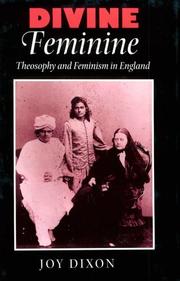| Listing 1 - 10 of 31 | << page >> |
Sort by
|
Book
Year: 1895 Publisher: New York, N.Y. Putnam
Abstract | Keywords | Export | Availability | Bookmark
 Loading...
Loading...Choose an application
- Reference Manager
- EndNote
- RefWorks (Direct export to RefWorks)
Book
Year: 1925 Publisher: London : Theosophical Pub. House for the General Council of the Theosophical Society,
Abstract | Keywords | Export | Availability | Bookmark
 Loading...
Loading...Choose an application
- Reference Manager
- EndNote
- RefWorks (Direct export to RefWorks)
Book
ISBN: 051197552X 1108072917 Year: 2011 Publisher: Cambridge : Cambridge University Press,
Abstract | Keywords | Export | Availability | Bookmark
 Loading...
Loading...Choose an application
- Reference Manager
- EndNote
- RefWorks (Direct export to RefWorks)
Henry Steel Olcott (1832-1907), co-founder of the Theosophical Society, was a versatile man. He is regarded as one of the pioneers of American agricultural education and also served in the U.S. War Department. Later Olcott was admitted to the New York Bar and became interested in psychology and spiritualism, travelling to India and Sri Lanka with Madame Blavatsky to explore eastern spiritual traditions, especially Buddhism. This volume covers the period 1883-1887: Olcott tells of his meetings with many of the 'Masters' of the Society and considers what has been achieved since he and Madame Blavatsky met in Vermont in 1874. He is invited to Burma by its king, who is interested in hearing about Olcott's work; Madame Blavatsky resigns as Corresponding Secretary of the Society and goes into exile in Europe. The author, however, is determined to give a fair assessment of her invaluable contribution to the Society.
Book
Year: 1925 Publisher: London : Theosophical Publishing house,
Abstract | Keywords | Export | Availability | Bookmark
 Loading...
Loading...Choose an application
- Reference Manager
- EndNote
- RefWorks (Direct export to RefWorks)
Theosophy --- Théosophie --- History --- Histoire --- Theosophical Society (Chennai, India)
Book
ISBN: 0380007347 Year: 1976 Publisher: New York, New York Avon Books / The Hearst Corporation
Abstract | Keywords | Export | Availability | Bookmark
 Loading...
Loading...Choose an application
- Reference Manager
- EndNote
- RefWorks (Direct export to RefWorks)
India --- the Theosophical Society --- biography --- Krishnamurti --- the astral plane
Book
ISBN: 9020210300 Year: 1991 Publisher: Deventer Uitgeverij Ankh-Hermes BV
Abstract | Keywords | Export | Availability | Bookmark
 Loading...
Loading...Choose an application
- Reference Manager
- EndNote
- RefWorks (Direct export to RefWorks)
Helena Petrovna Blavatsky --- Isis --- de geheime leer --- theosofie --- de Meesters --- Tibet --- Theosophical Society --- gnosis
Book
Year: 1922 Publisher: Calcutta, : Thacker, Spink & Co.,
Abstract | Keywords | Export | Availability | Bookmark
 Loading...
Loading...Choose an application
- Reference Manager
- EndNote
- RefWorks (Direct export to RefWorks)
Blavatsky, H. P. --- Besant, Annie (Wood), --- Leadbeater, C. W. --- Theosophical Society (Chennai, India).
Book
ISBN: 0436564181 Year: 1993 Publisher: London Martin Secker & Warburg Limited
Abstract | Keywords | Export | Availability | Bookmark
 Loading...
Loading...Choose an application
- Reference Manager
- EndNote
- RefWorks (Direct export to RefWorks)
the Theosophical Society --- Madame Blavatsky --- occult powers --- Secret Brotherhood --- Annie Besant --- Rudoplh Steiner --- Gurdjieff --- Krishnamurti --- theosophy --- western gurus --- esotericism

ISBN: 0801875307 9780801875304 0801864992 9780801864995 Year: 2001 Volume: 119th ser., 1 Publisher: Baltimore, Md. : Johns Hopkins University Press,
Abstract | Keywords | Export | Availability | Bookmark
 Loading...
Loading...Choose an application
- Reference Manager
- EndNote
- RefWorks (Direct export to RefWorks)
Divine Feminine is the first full-length study of the relationship between alternative or esoteric spirituality and the feminist movement in England. Historian Joy Dixon examines the Theosophical Society's claims that women and the East were the repositories of spiritual forces which English men had forfeited in their scramble for material and imperial power. Theosophists produced arguments that became key tools in many feminist campaigns. Many women of the Theosophical Society became suffragists to promote the spiritualizing of politics, attempting to create a political role for women as a way to "sacralize the public sphere." Dixon also shows that theosophy provides much of the framework and the vocabulary for today's New Age movement. Many of the assumptions about class, race, and gender which marked the emergence of esoteric religions at the end of the nineteenth century continue to shape alternative spiritualities today.
Feminism --- Emancipation of women --- Feminist movement --- Women --- Women's lib --- Women's liberation --- Women's liberation movement --- Women's movement --- Social movements --- Anti-feminism --- History. --- Religious aspects --- Theosophical Society (Great Britain) --- History of doctrines. --- Emancipation --- Theosophical Society in England --- Theosophical Society in England and Wales --- Esoteric sciences --- Sociology of the family. Sociology of sexuality --- Community organization --- Sexology --- Great Britain --- Esotericism --- Sexuality --- Women's suffrage --- Book --- the occult --- political alchemy --- New Age --- feminism --- ancient wisdom --- theosophy
Book
Year: 2011 Publisher: Project Gutenberg
Abstract | Keywords | Export | Availability | Bookmark
 Loading...
Loading...Choose an application
- Reference Manager
- EndNote
- RefWorks (Direct export to RefWorks)
Leadbeater --- C. W. (Charles Webster) --- 1854-1934 --- Theosophical Society (Chennai --- India) --- Besant --- Annie --- 1847-1933 --- Blavatsky --- H. P. (Helena Petrovna) --- 1831-1891
| Listing 1 - 10 of 31 | << page >> |
Sort by
|

 Search
Search Feedback
Feedback About UniCat
About UniCat  Help
Help News
News